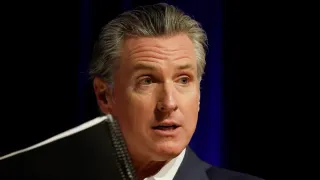
3 hours ago
Openly Gay Tech Billionaire Peter Thiel Warns That Fear of Technology Could Herald the Antichrist
READ TIME: 4 MIN.
Hundreds gathered outside the Commonwealth Club in San Francisco on Monday night, braving unusually cool September weather and a sea of protesters to attend Peter Thiel’s much-anticipated lecture on the Antichrist—a biblical figure whose arrival, Thiel argued, could be hastened by society’s collective fear and regulatory resistance to technological progress. The event, part of a four-part series organized by the ACTS 17 Collective, a nonprofit aimed at nurturing Christian community in tech, sold out within hours of its announcement, attracting a diverse audience of technologists, activists, and curious locals .
Protesters lined the sidewalk, many wearing demon masks and blasting death metal, while holding signs that read “Not today, Satan” and “Thiel gets rich, we get watched.” Their chants, including “Hey hey, ho ho, Peter Thiel has got to go,” reflected deep apprehension about Thiel’s influence in both technology and politics .
Inside, Thiel delivered a lecture described by attendees as scholarly yet repetitive, weaving together theology, history, literature, and politics to argue that regulatory fear of technology creates fertile ground for totalitarian control—a scenario he likened to the coming of the Antichrist .
Thiel’s views on the intersection of technology and apocalyptic prophecy are not new; he has spoken and written on the subject for at least a year, with renewed attention following his June appearance on New York Times columnist Ross Douthat’s podcast . In that conversation, Thiel suggested that the Antichrist might appear as a champion of regulation, advocating for restrictions on technological advancement under the guise of safety—a position he provocatively likened to climate activism .
Thiel’s analysis draws on a blend of biblical and philosophical sources, including the work of René Girard, a French philosopher known for his theories on violence and scapegoating. In a 2024 interview with Peter Robinson on the Hoover Institution’s “Uncommon Knowledge,” Thiel argued that apocalyptic prophecies can be seen as predictions of human behavior in a world without “sacred limits” on the use of increasingly powerful technologies such as nuclear weapons and artificial intelligence .
Thiel warned that both regulatory suppression of innovation and unchecked technological development pose existential risks. “We’ll either have the one government that destroys technology and takes over, or you have the AI that destroys everything,” he said at the San Francisco event, referencing possible scenarios in which humanity faces totalitarian control or catastrophic collapse due to runaway technology .
Peter Thiel’s position as a prominent gay conservative and tech investor complicates public perceptions of his message. As a long-time supporter of Republican candidates—including Donald Trump and JD Vance—Thiel’s views often spark debate within the LGBTQ+ community, particularly on issues of surveillance, AI, and the political use of religious rhetoric .
LGBTQ+ advocates have expressed concern about Thiel’s warnings, noting that historically, apocalyptic religious narratives have been used to justify social control and marginalize minority groups, including LGBTQ+ people. “When tech leaders invoke biblical end-times to argue against regulation, it’s important to ask who benefits—and who is at risk,” said a spokesperson for the National LGBTQ Task Force in an interview following the event .
Privacy and surveillance are central issues for LGBTQ+ communities, who have often been disproportionately targeted by both state and private sector monitoring. Thiel’s investments in companies such as Palantir, which provides big data analytics to law enforcement and intelligence agencies, have drawn criticism from LGBTQ+ rights organizations concerned about the risks of unchecked technological power .
The event also marked a notable intersection between faith and technology in Silicon Valley, with the ACTS 17 Collective seeking to build Christian fellowship among tech workers. Attendees described Thiel’s lecture as more philosophical than political, with some appreciating his challenge to conventional views of tech entrepreneurship. “The part about Thiel that’s interesting is he breaks your expectations about what a tech VC should be,” said one attendee .
Others were more critical, calling the talk “repetitive” and questioning its practical relevance for those concerned about the day-to-day realities of discrimination, surveillance, and digital privacy. A group of French tech workers gave the lecture a “7 out of 10,” noting Thiel’s “anti-introspection” stance and jokes about Elon Musk’s productivity .
Faith-based perspectives within the LGBTQ+ tech community remain diverse. Some see value in exploring spiritual questions alongside technological ones, while others worry that invoking the Antichrist could legitimize fear-mongering or distract from urgent issues such as algorithmic bias, online harassment, and equitable access to innovation.
As Thiel’s lecture series continues, LGBTQ+ advocates, technologists, and faith leaders are watching closely to see how these conversations evolve. The intersection of technology, religion, and politics remains fraught, with real implications for privacy, inclusion, and civil rights.
For LGBTQ+ people, the stakes are especially high. Whether the debate centers on AI ethics, surveillance, or the rhetoric of apocalypse, the community’s experiences offer important lessons on the need for transparency, accountability, and robust protections for marginalized groups. As technology continues to shape society in unpredictable ways, LGBTQ+ voices will be crucial in ensuring that progress does not come at the expense of freedom, dignity, or safety.






